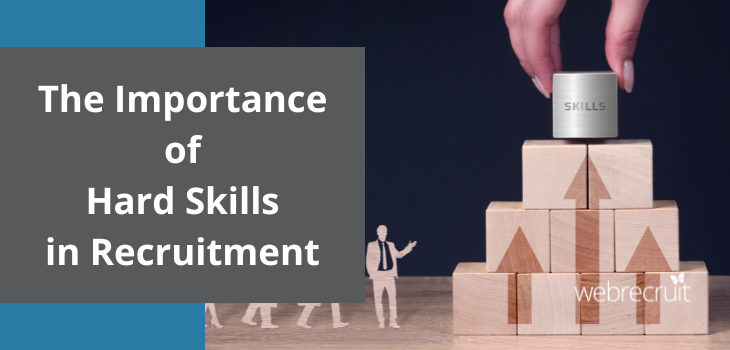Unlike soft skills, hard skills are easily quantifiable. They are experience and qualifications that are more job-specific than soft skills and feature in an essential criteria list. They can be learned through education and courses, ”on the job” training and through real world experiences.
Some hard skills can be vital for a candidate to have from the get-go, whether it’s a Translator who needs to be fluent in a specific language or a Head Chef who needs previous cooking experience.
However, it is key to the recruitment process to separate which hard skills are essential for a candidate to have before they begin a job (and should therefore be included as essential criteria), in comparison to what can be taught on the job. For example, you don’t want to tell a candidate that they need ‘demonstrable experience using WordPress’ if they only use WordPress rarely in the role you are recruiting for (and could be taught how to use it once in the role!).
If you want to find out how to create the perfect list of essential criteria for your job advertisement, as well as how to cultivate hard skills in the workplace, then read on!
Hard skills in your job advertisement
Depending on the type of role as well as the level at which a candidate would be working, hard skills can make up the majority of an essential criteria list or, in some cases, only a small segment.
As we have discussed in a previous blog post, an extensive list of criteria can put candidates off if they feel they don’t tick every box, are unsure if they meet certain requirements or if they simply choose not to read through them all and move on to the next advertisement!
That is why it’s key to evaluate which skills a candidate will need to have to be successful in the role from day one, in comparison to what can be taught in a training period. This will ensure you keep the criteria list clear and concise so candidates can understand exactly what is required of them.
As hard skills are typically easier to assess, this will also help you to be able to filter through candidates’ applications with a clearer understanding of how their experience and qualifications will fit into the role. This can be done through the inclusion of screening questions. Therefore, when a candidate’s application comes through, not only will you have their DV, but you will also be able to see clearly and separately whether or not they meet the criteria you need, e.g. do they have a driving licence?
Hard skills in the workplace
So, thanks to your excellent essential criteria list, you’ve hired the perfect candidate and they’re settling into the role nicely. Now you have the chance to focus on maintaining those essential hard skills.
Developing new hard skills in the workplace, as well as providing refreshers on existing ones, can increase employee productivity as well as confidence, allowing them to perform their roles to the best of their abilities, feeling encouraged and wanting to showcase their new skills.
This also shows employees that you are invested in their development and want to provide them with all the tools they need to succeed professionally and expand upon their skill set. This can help lead to greater employee retention if they believe your organisation is dedicated to prioritising their growth.
As a further bonus, working on employees’ hard skills in the workplace can simultaneously allow you the chance to hone their soft skills (which should never be overlooked!) as it can aid in fostering team spirit and collaboration as well as self-motivation and enthusiasm.
Bringing everything together
At Webrecruit, we can provide you with an expert copywriting service where we will help you to collate all your needed skills into a list of essential criteria and craft the perfect screening questions, so you can focus on hiring the ideal candidates and nurturing those skills!






